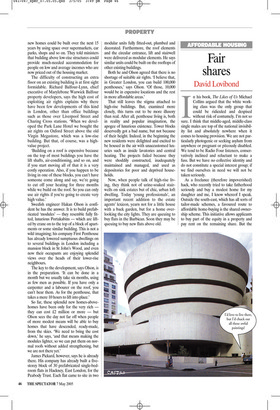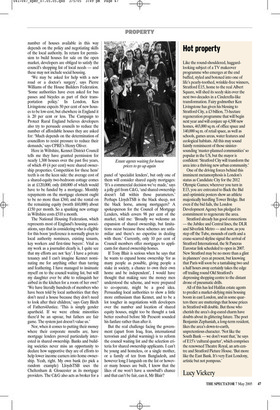Fair shares
David Lovibond
In his book, The Likes of Us Michael Collins argued that the white working class was the only group that could be ridiculed and despised without risk of contumely. I’m not so sure. I think that middle-aged, middle-class single males are top of the national invisibility list and absolutely nowhere when it comes to housing provision. We are not particularly photogenic or seeking asylum from anywhere or pregnant or piteously disabled. We tend to be Radio Four listeners, conservatively inclined and reluctant to make a fuss. But we have no collective identity and do not constitute a special interest group; if we find ourselves in need we will not be taken seriously.
As a freelance (therefore impoverished) hack, who recently tried to take fatherhood seriously and buy a modest home for my daughter and me, I know whereof I speak. Outside the south-east, which has all sorts of tailor-made schemes, a favoured route to affordable home-buying is the shared ownership scheme. This initiative allows applicants to buy part of the equity in a property and pay rent on the remaining share. But the number of houses available in this way depends on the policy and negotiating skills of the local authority. In return for permission to build houses for sale on the open market, developers are obliged to satisfy the council’s shopping list of local needs — and these may not include social housing.
‘We may be asked for help with a new road or a doctor’s surgery’, says Pierre Williams of the House Builders Federation. ‘Some authorities have even asked for bus passes and bicycles as part of their transportation policy.’ In London, Ken Livingstone expects 50 per cent of new houses to be low-cost, but elsewhere in England it is 20 per cent or less. The Campaign to Protect Rural England believes developers also try to persuade councils to reduce the number of affordable houses they are asked for: ‘Much depends on the determination of councillors to resist pressure to reduce their demands,’ says CPRE’s Henry Oliver.
Here in Wiltshire, Kennet District Council tells me they have granted permission for nearly 1,300 houses over the past five years, of which 49 (4 per cent) were shared ownership properties. Competition for these hens’ teeth is on the keen side: the average cost of a shared-equity two-bedroom cottage comes in at £120,000, only £60,000 of which would have to be funded by a mortgage. Monthly repayments on the mortgage element ought to be no more than £360, and the rental on the remaining equity (worth £60,000) about £150 per month. So a spanking new cottage in Wiltshire costs £510 a month.
The National Housing Federation, which represents most of England’s housing associations, says that in considering who is eligible for this boon ‘preference is normally given to local authority nominees, existing tenants, key workers and first-time buyers’. Vital as my work as a journalist clearly is, I quite see that my efforts are not ‘key’. I have a private tenancy and I can’t imagine Kennet nominating me for anything other than tarring and feathering. I have managed to insinuate myself on to the council waiting list, but will my daughter ever be able to relinquish her airbed in the kitchen for a room of her own? ‘We have literally hundreds of members who have been told by local authorities that they don’t need a house because they don’t need to look after their children,’ says Gary Birch of Fathers4Justice. ‘This is simply gender apartheid. If we were ethnic minorities there’d be an uproar, but fathers are fair game. The system just doesn’t value us.’ Nor, when it comes to putting their money where their corporate mouths are, have mortgage lenders proved particularly interested in shared ownership. Banks and building societies never miss an opportunity to declare how supportive they are of efforts to help lower income earners into home ownership. Yeah, right. My own bank (to pick a random example) LloydsTSB uses the Cheltenham & Gloucester as its mortgage providers. The C&G also acts as broker for a panel of ‘specialist lenders’, but only one of them will consider shared equity mortgages: ‘It’s a commercial decision we’ve made,’ says a jolly girl from C&G, ‘and shared ownership doesn’t fall within those parameters.’ Perhaps LloydsTSB is the black sheep, not the black horse, among mortgagers? A spokesperson for the Council of Mortgage Lenders, which covers 98 per cent of the market, told me: ‘Broadly we welcome an expansion of shared ownership, but limitations occur because these schemes are unfamiliar and there’s no expertise in dealing with them.’ Currently, only 10 per cent of Council members offer mortgages to applicants for shared ownership homes.
If Tony Blair is serious when he says that he wants to expand home ownership ‘for as many people as possible, giving people a stake in society, a chance to own their own home and be independent’, I would have thought that making sure the money men understood the scheme, and were prepared to co-operate, might be a good idea. Persuading local authorities to show a little more enthusiasm than Kennet, and to be a lot tougher in negotiations with developers over the number and location of shared equity houses, might too be thought a task better resolved before Mr Prescott sounded his fanfare rather than after it.
But the real challenge facing the government (apart from Iraq, Iran, international terrorism and global warming) is to reform the council waiting list and the selection criteria for shared ownership applicants. I can’t be young and homeless, or a single mother, or a family of ten from Bangladesh, and however long I languish on the list or however many houses are built, I know that the likes of me won’t have a snowball’s chance and that can’t be fair, can it, Mr Blair?




























































 Previous page
Previous page